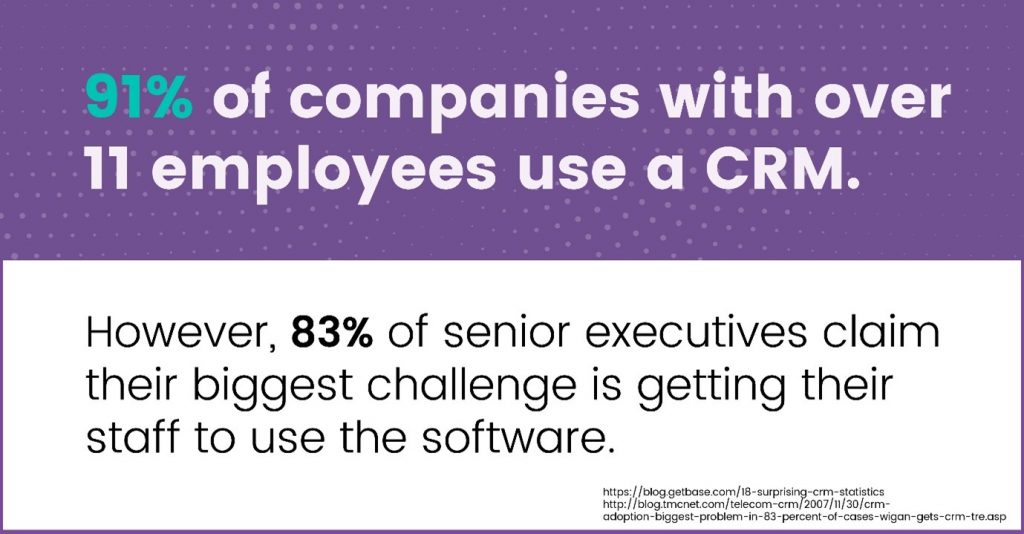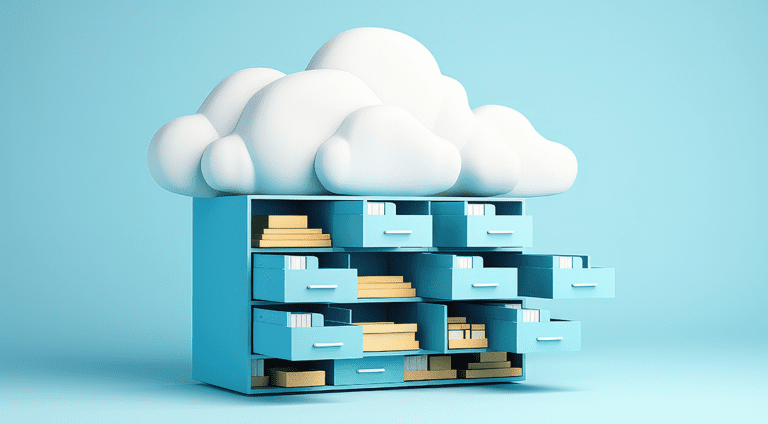For most businesses, their most valuable and important asset is their customers. In the early days at a lot of companies, the details about those customers — who they are, how they’ve interacted with your organization — are spread out in many different places. The CEO’s brain, a sales rep’s inbox, the accountant’s stack of invoices.
As a business grows, it quickly becomes necessary to have one central place where all this information lives.
Your team will be slowed down without quick answers to important questions. Who are our customers? How do we get in touch with them? How do they interact with our content? What does our pipeline of new business look like?
Your prospects and customers feel the pain when your team isn’t on the same page. From their perspective, they have a relationship with one company, not a collection of different people and departments. Everyone on your team needs context about every customer’s needs, wants, and current state. That way, anyone can pick up the conversation when needed.
These are the problems that CRM systems are designed to solve.
With one central place to organize all the details of your leads and customers. It’s easy for everyone to gain insight into your business, and the status of every customer relationship. And while CRMs are a powerful tool in their own right, there are a number of integrations, like CloudCall, that can take them to the next level.
Never heard of CRM? Or perhaps it’s been mentioned and you’re not sure what it means? Have no fear, we’ve got you covered…
What is CRM?
CRM stands for Customer Relationship Management. The key is in the name, it’s getting the most out of your relationship with customers – both on an individual level and to understand the customers’ overall experience. When used effectively, the CRM system has the power to transform customer satisfaction.
Customer experience is one of the cornerstones around which a successful business is built. It’s importance stems from the fact that without impressing new and existing customers, they will likely take their business elsewhere. What’s more, when customer experience is great, your customers will encourage others to use your business. All of this will ultimately affect your business’s bottom line.
The term ‘CRM system’ refers to a piece of software that stores customer contact information. It allows a business to manage interactions across multiple communication channels. CRM systems allow everyone in the business to have access to all the information they need when interacting with customers. This could be salespeople speaking to prospects, customer service agents when dealing with customer enquiries or marketing teams setting up automated campaigns. Because of the wide variety of CRM systems, it’s possible to find one which perfectly complements your unique business strategy. Some platforms have been designed as a one-size-fits-all solution for many industries. Others have been created to suit a specific industry. If you are investing in a CRM, it’s worth taking some time to think about what functionality you need. Only then should you speak to any suppliers.
What functionally does a CRM provide?

Does my business need a CRM?
You’ll struggle to find a business which doesn’t view its customers as a vitally important asset. As businesses grow, managing the relationship with these customers can become increasingly complicated. With multiple team members across multiple departments, CRM systems allow everyone in the business to see all customer data. This can include their contact details, and any previous interactions they have had. Information can be used to ensure the customer doesn’t have to repeat themselves, and the employee knows the full picture.
CRMs are widely used, in fact, 91% of businesses with over 11 employees use a CRM system.
Why are they so popular? Because a CRM system makes your business more efficient. In a customer centric environment with multi-channel communications, keeping track of it all is virtually impossible without the right tools. To top it off, customers are becoming more demanding and more sophisticated so maintaining a competitive edge is another challenge. Our whitepaper, Perfecting the art of conversation: how businesses are managing increased call volumes, has highlighted the importance of businesses having access to a single source of customer information. So, if you value the experiences of your customers, and you want to continue to grow, you’ll need a CRM!
What are the benefits?
Simply put, the use of a single CRM improves the customer experience. Every interaction, whether it’s a call, email or online enquiry is recorded and accessible to everyone. This allows all team members, throughout the customer’s entire journey, to have access to all the information they need. Having this data helps to make your customers feel valued and makes them feel like you understand their bespoke needs. Take a look at our short video to discover the importance of a single CRM.
Other benefits include….
- Collaboration across the business: Everyone in the business has the information to get their jobs done to the best of their ability. This provides seamless interactions for remote teams and multi-national businesses, ultimately improving the quality and speed of service for customers.
- Improve Efficiencies: Depending on your CRM, there are many features which are designed to save time throughout the day. These can be simple features like clicking on phone numbers to automatically dial them or setting up complex workflows which send a series of promotional emails to prospective customers.
- Targeted Communications: Use customer and prospect engagements to ensure you are providing them with messaging that fits their industry or specific needs. Humans talk to humans and personalised messages cut through the noise.
- Improve management: With everything stored in the CRM, managers can easily setup KPIs and ensure their employees are carrying out processes correctly. For salespeople this could be monitoring the sales process, ensuring leads are being followed up correctly, in a timely manner. In a customer service function, management can use a CRM to keep track of open tickets and customer feedback scores.
- Sale pipeline management: The CRM can easily be used to calculate sales forecasts, work out the total value of deals in the pipeline or calculate the number of deals closed within a specific timeframe. Sales teams can use this information to learn from the past and make improvements to their sales strategy.
- Improved customer relationships: You can easily manage customer issues and complaints because all interactions to date are easy to access. This will ensure more customers walk away happy and impressed.
How much does one cost?
CRMs can range in price, and the price can be calculated in different ways depending on the platform. Many CRMs charge per user, which could be a monthly subscription cost. It’s usually easy to add or remove users depending on your business’s growth. Some CRMs change based on the number of customer records you have stored in the system.
It’s also common for CRMs to charge for additional functionality. You should also look out for one–time fees for setup, installation, and training. While costs can seem high, there is a lot of competition in the market which helps to keep prices low. There are even CRM providers which offer free versions of their software with limited functionality and storage size.
Some platforms have been designed as a one-size-fits-all solution for many industries, while others have been created to suit a specific industry. Some will offer a large range of external integrations so you can customize to your heart’s delight, others only have a few external applications which can be used. Finding the right system might be a bit overwhelming – but when you find the right one, you’ll see the true value they can bring to your business.
There really is a CRM out there for every budget. So, it depends on how much your business is willing to invest in its customers and growth strategies.
Is it possible to get more out of your CRM?

Most CRM systems offer an out-of-the-box solution which can cater for a number of different business needs. But sometimes, this might not be enough, so many CRMs offer third party apps or integrations which enhance their solution. There are a host of integrations and add-ons which can provide telephony (like CloudCall!), email services, more detailed reporting, customer feedback surveys, advanced automation… the list goes on. In fact, some CRMs have such a well-developed ecosystem of add-ons that you’d struggle to not find what you are looking for.
While CRM software is powerful on its own, integrating your CRM with other tools across your technology stack has the potential to make your life so much easier. Instead of using your CRM as a system that retains customer information, integrating with external tools can bring powerful functionality that the CRM is not capable of on its own.
With integrated telephony and messaging, it becomes simple to track the customer and all their interactions, allowing you to see the full customer journey. Having a CRM with integrated applications allows for processes to be streamlined and reporting to be more accurate.
But, getting the most out of a CRM system doesn’t just mean technology. We’re talking CRM culture. You may not have heard of CRM culture, so let’s break it down; we know that Culture can be thought of as behaviors and values that are shared among a group of people. When applied in the context of the CRM system, it simply means having the full team on board and using the CRM system to its full potential.
CRM systems have the power to improve management efficiencies, produce higher performing customer service and increased profits. But if staff aren’t using it to its full potential, it becomes little more than a glorified address book.
So, what should companies do if they want to make the most of their CRM? The answer is to look at the culture of the organization and see if it’s promoting the use of the CRM or hindering it. Creating a CRM culture within an organization ensures everyone wants to use the CRM as much as possible because they understand the value it can bring to their role, their teammates and the business as a whole.

Here are 5 tips to kick-start your CRM culture:
- Training: Make sure everyone on the team is fully trained on both the functionality and the benefits of the CRM. Explain it to them, make sure they understand how it helps to solve their problems.
- Introduce new metrics: This encourages use of the CRM, collaboration between teams and departments.
- Set up rewards: Depending on the type of business, a reward system might be the best way in incentivize employees to use the CRM.
- Listen to employee feedback: Your employees are your best source of information regarding the CRM’s adoption. Encourage them to speak up if they feel that a process could be improved upon, or if they are having difficulty with any part of the system.
- Give it time: Implementing a CRM culture can be just as challenging as implementing the software itself. Getting everyone used to the CRM will take time but it’s possible if you continue to emphasise the benefits to each individual and to the business.
At the end of the day, customer satisfaction leads the way to growth and success within your business. Investing in a CRM system and CRM integration can make all the difference, leading to happy customers who feel valued, understood, and respected.
Is this the Golden Age of the CRM?
In an article for techradar.pro, Désiré Athow sat with Marcin Malinowski, Director of International Services at European CRM Consultancy Outbox, for his thoughts on the current state of the CRM industry. He provides his insight into the biggest challenges for CRM companies, how new technology is affecting them and what the future looks like for the industry.
Malinowski makes several noteworthy points that we wanted to share, as well as add in some additional thoughts.
Malinowski covers the big names in CRM including, Salesforce, Microsoft, SAP and Oracle, but also highlights smaller companies making a splash like SugarCRM.

Competition is always good for the end user. It forces providers to continuously innovate and address frustrations and limitations. Whether it’s overly complicated workflows or glitches in the system – providers will need to step up to keep your business.
And when it comes to challenges for the bigger CRM companies, Malinowski says the top priority is getting the cloud right.
“Right now it’s all about delivering CRM via the cloud, and the big players are really trying to get that right – we’re seeing a lot of changes due to the cloud delivery model and the consumerization of IT.”
We don’t disagree – the cloud is key to a successful CRM. Users expect flexibility and access that is hard to gain with an on-premise solution. They want to be able to integrate and attach all of their systems like a K’NEX Set.
Malinowski stated that he expected to see an explosion of customer data and the CRM needing to expand to hold all of it. With the growing amounts of data, it’s hard to imagine how Malinowski’s assertion could prove false. Either the CRM companies adapt or fail. Users have tough demands on their CRMs which will only escalate over time. “the next decade in CRM is set to be a very exciting one.”
In summary
A CRM system is one of the most important pieces of business technology you can use. Any organization which interacts with customers on a regular basis can massively benefit from the power of a modern CRM system. It’s a great place to store data, but as we’ve covered in this article, it’s capable of so much more. The core functionality of the system offers benefits that support most business functions including sales processes, marketing automation, customer service and operations. These functions can gather information on your customers, help manage workloads, personalize the customer experience, and increase customer satisfaction.
There are countless benefits of using a CRM tool, but perhaps the most important are the improvements to efficiency, increased collaboration, and the ability to keep track of customers. Get the most out of a CRM platform by encouraging a positive CRM culture across the whole organization.

Using a CRM system as a single platform to store customer interactions is a great way to reduce mix-ups. Duplicating information across systems or adding details to the wrong database can mean a loss of valuable customer conversations, making it difficult to resolve customer complaints and help with customer enquiries.
A CRM platform is a great way of keeping track of customer account details, account history and for managing interactions with existing and potential customers. Tracking these interactions can help you understand your customers through their buying habits, queries, requests and even their complaints.
The importance of customer experience is crucial to the growth and development of your brand. A great customer experience can build loyalty, that through word of mouth and positive reviews will lead to more customers, meaning more profit for your business.
CloudCall makes business communications quicker and more powerful.
Our leading cloud-based phone system fully integrates with CRM systems to make your life easier. Combining features like click-to-dial, call recording, SMS and screen pop–ups together with the power of your CRM. You can view our extensive list of features if you want to learn more. Contact a member of our team to discover how CloudCall can grow your business with a seamless integration into your CRM.




